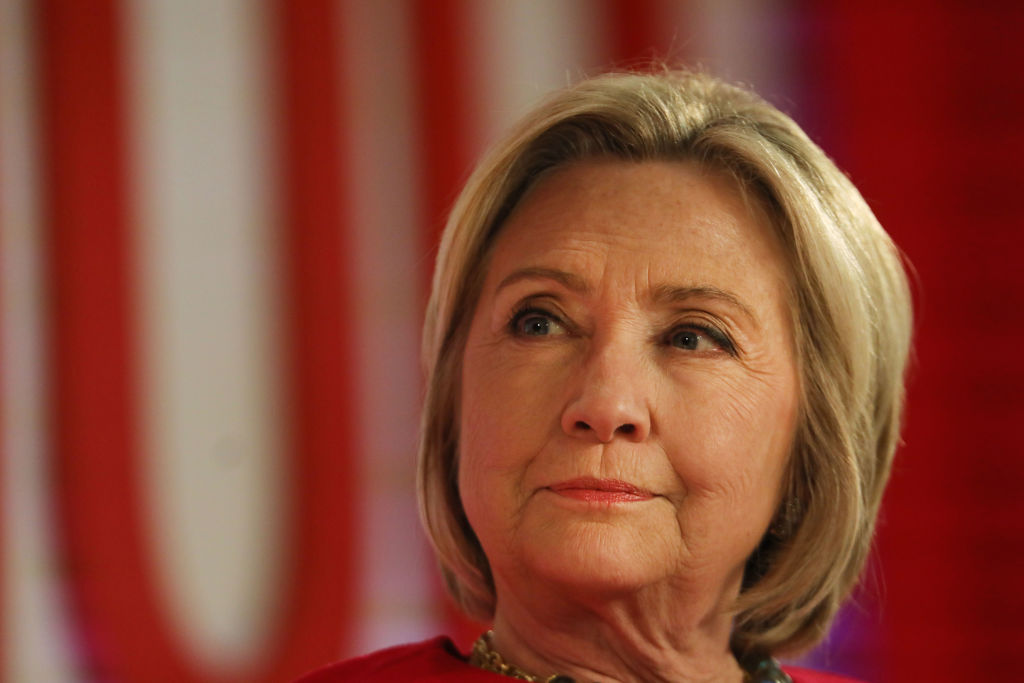It always ends up back with the Clintons, doesn’t it? The laws Trump may be charged under at Mar-a-Lago appear to have been violated by both of the Clintons, yet the two were never searched, never mind charged and never prosecuted. Any action against Trump must account for that to preserve what is left of faith in the rule of law applied without fear or favor, or risk civil disenfranchisement if not outright civil unrest.
The more obvious case involves former Secretary of State Hillary Clinton, who maintained an unsecured private email server that processed classified material on a daily basis. Her server held at least 110 known messages containing classified information, including e-mail chains classified at the Top Secret/Special Access Program level — the highest level of civilian classification — that included the names of CIA and NSA employees.
The FBI found classified intelligence improperly stored and transmitted on Clinton’s server “was compromised by unauthorized individuals, to include foreign governments or intelligence services, via cyber intrusion or other means.” Clinton and her team destroyed tens of thousands of emails, potential evidence, as well as physical phones and Blackberries that potentially held evidence. She operated the server out of her home kitchen despite the presence of the Secret Service on property who failed to report it. Her purpose in doing all this appeared to have been avoiding Freedom of Information Act requests during her tenure as SecState, and maintaining control over what records became part of the historical archive post-tenure.
Clinton seems to have violated all three statutes Trump was searched under:
- 18 USC §§ 793: “Gathering, transmitting or losing defense information” says, “Whoever, for the purpose of obtaining information respecting the national defense with intent or reason to believe that the information is to be used to the injury of the United States, or to the advantage of any foreign nation…” This law is part of the infamous Espionage Act of 1917. Parts of the Espionage Act also include a gross negligence standard, meaning a prosecutor does not have to prove specific intent in all cases. That Clinton’s server was compromised strongly speaks to the question of injury to the United States.
- 18 USC §§ 2071: “Concealment, removal, or mutilation generally of any record…” is a no-brainer for Clinton, given that she destroyed thousands of emails, physical hard drives, and handheld devices.
- 18 USC §§ 1519: The “anti-shredding provision” which imposes criminal penalties on anyone who “knowingly alters, destroys, mutilates, conceals, covers up, falsifies, or makes a false entry in any record, document, or tangible object with the intent to impede or obstruct an investigation.” Clinton destroyed much of the data during an investigation into her communications, satisfying intent. Her overall intent was to block FOIA requests, and might speak to intent to impede or obstruct some investigation that required the full diplomatic record be made available.
Absent a trial, no one can say conclusively Clinton was guilty of what Trump is likely to be charged with, but the basic elements are there. That is not the point anymore anyway. The point is that if the FBI is going to take a similar fact set and ignore one while aggressively pursuing another, it risks being seen as partial and political. Any further action against Trump and certainly any prosecution of him must address why Hillary was not searched and prosecuted herself. Fair is fair, after all.
And then there’s Bill Clinton. Bill made a series of some seventy-nine audio tapes from 1993-2001 with a historian inside the Oval Office, sometimes recording his thoughts and decision-making, other times directly recording his phone calls. He kept the raw tapes himself after a book was published in 2009, actually storing them in a dresser drawer inside the White House residence. Activist group Judicial Watch sued Bill for the tapes, claiming they were presidential records and had to be made available to the public through the National Archives (NARA), and that the Archives needed to seize the tapes. Clinton argued they were personal records outside the control of NARA.
In directly contravening what is happening with Trump, the court ruled in 2012, “NARA does not have the authority to designate materials as ‘presidential records,’ and NARA lacks any right, duty, or means to seize control of them.”
Judicial Watch argued the Clinton tapes should have been included among the presidential records transferred to the Archivist at the end of the Clinton presidency, but Bill retained them in his personal possession when he left office and refused to produce them for use by Judicial Watch or to hand them over to NARA, considering them his own property, just like the underwear and socks with which he stored the tapes among in his dresser. Judicial Watch lost the case and never appealed, and the tapes presumably remain with the Clintons.
As with the Hillary case, any prosecution of Trump for dispossessing presidential records must address the precedent set in the Bill Clinton case, i.e., the simple assertion by Bill that the tapes were his personal property. More significantly, going forward on the Trump case, the DoJ must address the court’s decision in the Bill Clinton case that, “NARA does not have the authority to designate materials as presidential records, and NARA lacks any right, duty, or means to seize control of them.” In other words, for what Trump had in his possession to be government records, someone would have had to designate them as such. The court in Judicial Watch v. NARA said NARA could not make such a designation, and the FBI certainly is not legally the one to do it. Could it be the president himself designates when a record is official and when it is personal?
Sort of. It appears a president’s discretion on what are personal versus official records is far-reaching and solely his, as is his ability to declassify or destroy records at will. Per Judicial Watch, “under the statutory scheme established by the Presidential Records Act (PRA) the decision to segregate personal materials from presidential records is made by the president, during the president’s term and in his sole discretion… Since the president is completely entrusted with the management and even the disposal of presidential records during his time in office, it would be difficult for this Court to conclude that Congress intended that he would have less authority to do what he pleases with what he considers to be his personal records.”
Now to be fair, there is a considerable amount of case law trying to define more clearly what is a presidential record and what is a personal record. There are also mechanisms to try to resolve differences of opinion between a president and NARA. But none of those mechanisms are criminal, and none seem to involve physically seizing documents under a search warrant. It is clear the PRA does not bestow on the president the power to assert sweeping authority over whatever materials he chooses to designate as presidential records without any possibility of judicial review. But NARA, on the other hand, cannot do so either. The battleground under the PRA is the courts, not the back rooms at FBI headquarters.
If Trump were to designate a record as personal, not presidential, and NARA disagreed, it appears the standard mechanism (as shown in the Bill Clinton case) would be to go to court to re-designate the record. Step One (as in the Bill Clinton case) is not for the FBI to seize the record acting as some Solomon-like neutral party between the president and NARA. The bottom line is Bill Clinton was able to hold on to his audiotapes as personal records, and the tapes were never seized by the FBI under threat of the Espionage Act.
Any attempts to move the Trump case forward as a criminal one will first need to explain how it differs from the Bill Clinton case and from Hillary Clinton and her server. If DOJ can’t do that, then they have no basis to claim they are enforcing the law without fear or favor. It will be just plain old political quackery, using the criminal justice system to defeat Trump when the electoral system will not.


















